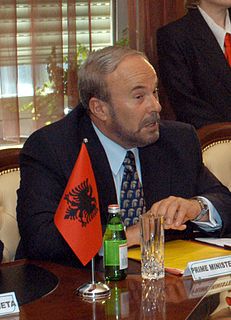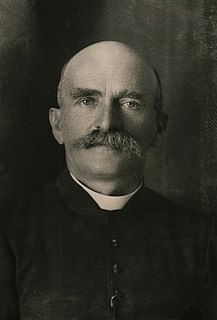
Ramiz Tafë Alia was the second and last leader of the People's Socialist Republic of Albania from 1985 to 1991, serving as First Secretary of the Party of Labour of Albania. He was also the country's head of state from 1982 to 1992. He had been designated as successor by Enver Hoxha and took power after Hoxha died.

Fatos Thanas Nanolisten (help·info) is an Albanian socialist politician who was the Prime Minister of Albania several times; he was the first leader and founder of the Socialist Party of Albania and a member of the Albanian Parliament from 1991 to 1996 and 1997 to 2009. He reformed the Anti-Revisionist Marxist-Leninist ideology of the Labor Party of Albania into social democracy for its successor, the Socialist Party. During his leadership, the Socialist Party, as a result of reforms, joined the Socialist International and Party of European Socialists. Nano was a candidate in the 2007 presidential election but did not win. He again tried in the 2012 presidential election, but he did not even qualify as a candidate, because the leaders of parties in Parliament obstructed their respective MPs to elect him as candidate in the elections.

Ndre Mjeda was an Albanian philologist, poet, priest, rilindas, translator and writer of the Albanian Renaissance. He was a member of the Mjeda family.

Gjergj Fishta was an Albanian Franciscan friar, poet, educator, politician, rilindas, translator and writer. He is regarded as one of the most influential Albanian writers of the 20th century due to his epic masterpiece Lahuta e Malcís and the editor of two of the most autoritative magazines after Albania's independence, Posta e Shypniës and Hylli i Dritës.

Scribner's Magazine was an American periodical published by the publishing house of Charles Scribner's Sons from January 1887 to May 1939. Scribner's Magazine was the second magazine out of the Scribner's firm, after the publication of Scribner's Monthly. Charles Scribner's Sons spent over $500,000 setting up the magazine, to compete with the already successful Harper's Monthly and The Atlantic Monthly. Scribner's Magazine was launched in 1887, and was the first of any magazine to introduce color illustrations. The magazine ceased publication in 1939.

Rexhep Qosja is a prominent Albanian writer and literary critic from a part of Malësia in modern Montenegro. He holds a bachelor's degree from the University of Pristina and graduated with a master's degree from the University of Belgrade Faculty of Philology in 1968.
The Bar massacre was the killing of an unclear number of mostly ethnic Albanian from Kosovo Yugoslav Partisans in late March or early April 1945 in Bar, a municipality in Montenegro, at the end of World War II.

TV Klan is a private television channel with national coverage based in Tirana, Albania.

Krahu i shqiponjës is an Albanian national magazine that first appeared in the democratic post-communist period, in Tirana (Albania), in 1995, in progress of Bilal Xhaferri's magazine, which was published in Chicago, United States. The spiritual leader was and still remains Bilal Xhaferri.

Petro Marko was an Albanian writer. His best-known novel is titled Hasta La Vista and recounts his experiences as a volunteer of the Republican forces during the Spanish Civil War. Petro Marko is widely regarded as one of the founding fathers of modern Albanian prose.

Poedjangga Baroe was an Indonesian avant-garde literary magazine published from July 1933 to February 1942. It was founded by Armijn Pane, Amir Hamzah, and Sutan Takdir Alisjahbana.
Blendi Fevziu is an Albanian journalist, writer and host of the TV talk show Opinion, which first went on air on August 31, 1997.
The Toptani family was the leading Albanian noble family in central Ottoman Albania at the beginning of the 20th century. The Toptani family belonged to a small number of noble families appointed by the Ottomans who used local chieftains to control Ottoman Albania more easily. Essad Pasha Toptani, the head of the family at the beginning of the 20th century, claimed that the family descended from the Thopia family. According to some sources, the name is derived from the word top, which means cannon, as the family owned a cannon at a time when artillery was rare.

Shqypeja e Shqypenis was an Albanian language twice-monthly newspaper published from Sofia, Bulgaria 1909-1911. The first issue was published on May 18, 1909. Josif Bageri was the manager of the publication. It covered political, social, cultural and literary affairs.

Shoqnia e Bashkimit të Gjuhës Shqipe, usually known as the Shoqnia Bashkimi, or simply Bashkimi i Shkodrës was a literary society founded in Shkodra, Ottoman Empire in 1899. The Bashkimi society was the union of three previously independent societies: Shpresa, Drita and Dituria. Drita, a journal was the official publication of the Bashkimi Society.

Përpjekja shqiptare, published by Branko Merxhani, and administered by Petro Marko was a literary magazine, published in Tirana, Albania from 1936 to 1939.
Mustafa Gjinishi was an Albanian communist from Peqin, central Albania. He was known for having opposed Enver Hoxha and the Italian invasion of Albania.
Aleksandër Merxhani mostly known as Branko Merxhani (1894–1981) was an Albanian intellectual, sociologist, writer, journalist and literary critic. He was one of the most important cultural figures of the pre-World War II in Albania, publisher of Përpjekja shqiptare. During the '30s he developed an ideological program named Neo-Albanianism, which he developed being heavily influenced by Turkish sociologist Ziya Gökalp.
Stefan Shundi (1906-1947) was an Albanian writer, literary critic, journalist, lawyer, football player, and sports director. During 1933-1936 he was president of the KF Tirana football association.
Naxhije Dume was an Albanian politician. She was one of the first group of female members of the Albanian parliament and the first female minister, serving briefly as Minister of Education in 1948.












